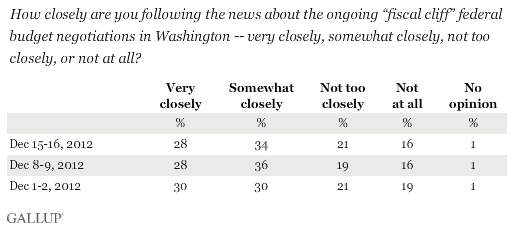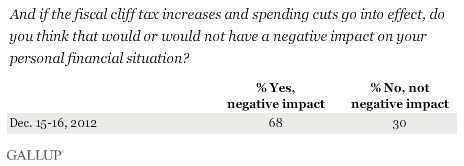PRINCETON, NJ -- Americans' level of interest in the news surrounding the fiscal cliff negotiations remains about the same as it has been since the beginning of the month, despite continuing news coverage of the pending tax increases and spending cuts that would take place on Jan. 1 if no agreement is reached to forestall them. Currently, 62% of Americans are following the fiscal cliff news story very or somewhat closely, similar to what Gallup found Dec. 1-2.

The 62% who are following the fiscal cliff news closely is near the average level of attention paid to the more than 200 news stories Gallup has tracked since 1991. This past weekend, the Newtown school shooting tragedy dominated the news, which may have affected the most recent measure of Americans' focus on the fiscal cliff negotiations.
News reports on Monday and Tuesday indicate that President Barack Obama and Speaker of the House John Boehner may be getting closer to an agreement that would prevent the fiscal cliff tax increases and spending cuts from taking place. If so, the public would consider this a positive development. Most Americans continue to foresee negative effects on the United States and on themselves personally if an agreement is not reached.
More than two-thirds of Americans in the Dec. 15-16 survey say increases in federal income and Social Security payroll taxes, and major cuts in U.S. domestic spending would have a negative impact on the United States as a whole. Similarly, 68% say if government leaders fail to agree and the fiscal cliff measures take effect, that would have a negative impact on their personal financial situations.
These attitudes are roughly the same as they were the first time Gallup measured them, in early December.
![Suppose no agreement is reached by the deadline and the fiscal cliff measures go into effect. Please say whether you think each of the following would or would not have a negative impact on the United States as a whole. How about -- [RANDOM ORDER]? December 2012 results](http://content.gallup.com/origin/gallupinc/GallupSpaces/Production/Cms/POLL/3epna5wayu-5ixy0e5k5qg.gif)

Americans Continue to Want Compromise
The news that both President Obama and Speaker Boehner are apparently willing to modify their initial starting points in the negotiations in order to reach an agreement fits Americans' preferences. In the Dec. 15-16 survey, 66% said it was better that government leaders in Washington compromise rather than sticking to their principles and beliefs, down slightly from 70% last weekend, but up from 62% Dec. 1-2.
![Trend: What would you like to see government leaders in Washington do in the fiscal cliff negotiations -- [ROTATED: stick to their principles and beliefs on tax increases and spending cuts, even if no agreement is reached by the Jan. 1 deadline, (or) compromise on their principles and beliefs on tax increases and spending cuts in order to reach an agreement by the Jan. 1 deadline]?](http://content.gallup.com/origin/gallupinc/GallupSpaces/Production/Cms/POLL/uzl55o7m2uyuteehbkutfw.gif)
Bottom Line
Although Americans are paying only about average attention to the news about negotiations to prevent the fiscal cliff tax increases and spending cuts, they clearly want an agreement to be reached. Americans perceive negative consequences for the country and for themselves personally if an agreement is not reached, and want their leaders to compromise to avoid that outcome.
Survey Methods
Results for this USA Today/Gallup poll are based on telephone interviews conducted Dec. 15-16, 2012, on the Gallup Daily tracking survey, with a random sample of 1,022 adults, aged 18 and older, living in all 50 U.S. states and the District of Columbia.
For results based on the total sample of national adults, one can say with 95% confidence that the maximum margin of sampling error is ±4 percentage points.
Interviews are conducted with respondents on landline telephones and cellular phones, with interviews conducted in Spanish for respondents who are primarily Spanish-speaking. Each sample includes a minimum quota of 400 cellphone respondents and 600 landline respondents per 1,000 national adults, with additional minimum quotas among landline respondents by region. Landline telephone numbers are chosen at random among listed telephone numbers. Cellphone numbers are selected using random-digit-dial methods. Landline respondents are chosen at random within each household on the basis of which member had the most recent birthday.
Samples are weighted by gender, age, race, Hispanic ethnicity, education, region, adults in the household, population density, and phone status (cellphone only/landline only/both, cellphone mostly, and having an unlisted landline number). Demographic weighting targets are based on the March 2011 Current Population Survey figures for the aged 18 and older U.S. population. All reported margins of sampling error include the computed design effects for weighting.
In addition to sampling error, question wording and practical difficulties in conducting surveys can introduce error or bias into the findings of public opinion polls.
View methodology, full question results, and trend data.
For more details on Gallup's polling methodology, visit www.gallup.com.
